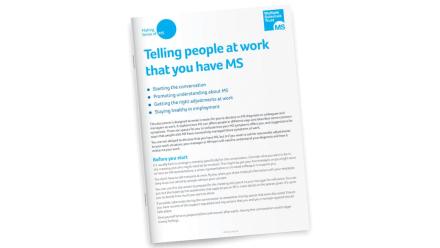Facing MS relapses and an unsupportive work situation, Lou’s MS nurse stood tall and fought her corner. Read on to find out how …
I worked for large utilities company between 2002 - 2015 working in various departments. I was diagnosed in 2006. There I was, thinking that I would get lots of support throughout my career. How wrong I was …
I still remember the first time I had a relapse and was off for a while. Upon my return, I was hauled into a meeting with my manager and HR, where I had the capability policy thrown at me.
Of course, there was no mention of a union representative or my rights. I wondered if this was a sign of things to come…
It goes without saying that this upset me immensely - not knowing where I stood and if I was going to lose my job.
I contacted my MS nurse, at the time, who was nothing short of amazing. She stated that we needed to urgently set up a meeting with my employer.
The meeting was arranged with HR, my manager, a company nurse, occupational health, and my MS nurse. I joined them later on.
My MS nurse asked if my work was an issue, which it wasn’t. However, it always seemed to be a problem for my employer when I was off with a relapse.
My MS nurse was someone you always wanted on your side, someone you could trust, someone who would fight tooth and nail for her patients.
But trust me, you wouldn’t want to cross her when she was sticking up for her patients.
My MS nurse came in numerous times to support me, my employer and staff. However, when times were really difficult, they refused to let her visit as they didn’t want to hear the truth.
I was never really supported that well by this employer.
Times became really difficult with work around 2014 as I had numerous relapses. Do you know what? I just got out of there and left that toxic environment.
I felt that I had confirmation that they were discriminating against me. But I was so unwell and stressed. The thought of further battles in court with them was just too much to deal with. So, I handed in my notice.
Having MS makes you realise that some things have to give. With a family to care for and MS, I felt I had to change career paths. I now work in a school helping in the kitchen, preparing meals.
This new role gives me social interaction and independence, but also gives me time to rest and be with my family. I now work part-time hours. I would say that the rest periods have had a positive impact on my MS.
My advice to others would be find the people who can advocate for you. I know that not everybody will be able to enlist their MS nurse for workplace support.
But find someone who can help, whether that be a union representative, occupational health or someone industry specific.
As someone who has dealt with a difficult work situation and come out of the other side, I would also recommend finding out as much as you can about your rights and what you’re entitled to.
Knowledge is power!




